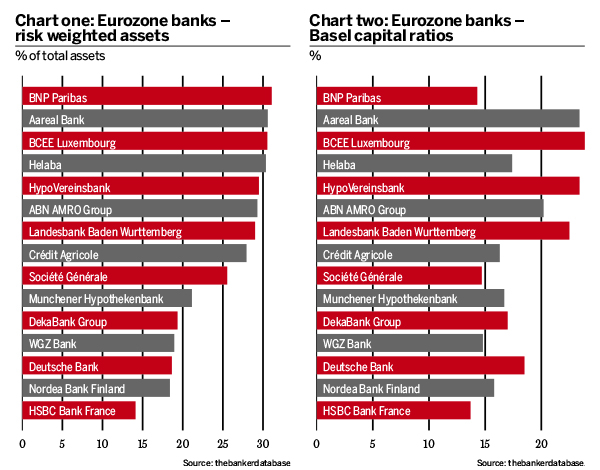Eurozone banks that have taken an aggressive stance to risk-weighting their assets may face most scrutiny from the European Central Bank’s comprehensive assessment.
The European Central Bank (ECB) is due to release the results of its comprehensive assessment of more than 120 eurozone banks during October 2014. This assessment includes a stress test of bank balance sheets under various scenarios, and also an asset quality review (AQR) to verify the existing state of bank portfolios.
Tight-lipped
While banks have undergone stress tests at European and national levels several times since the start of the eurozone crisis in 2010, the AQR is an unprecedented development. For the first time, the ECB will cast its own eye over banks’ analyses of their loan books, something that has previously been supervised only at a national level. On several occasions, national supervisors evidently misjudged asset quality – most notably, in the case of real estate exposures at Spain’s savings banks (cajas). The Banco de Espana subsequently published a report (in October 2012) that identified “shortcomings” in its supervisory approach prior to the crisis.
The ECB has taken great care to keep details of the AQR confidential until all the results are published, and any estimates of additional capital that the regulator may require are speculative at this stage. However, the ECB has indicated that a central part of the examination process will be whether the risk weights assigned by banks to their assets are sufficiently conservative.
This suggests that banks with very low ratios of risk-weighted assets to total assets could be tested most severely by the AQR. Some of those banks are special state-owned institutions with a development finance brief – such as Germany’s agricultural policy lender Rentenbank or its Dutch equivalent Nederlandse Waterschapsbank. As their assets often enjoy state guarantees, risk weights are naturally low and this should not be a cause for concern. Similarly, the central service banks for co-operative banking groups (such as Germany’s WGZ) will tend to hold a high proportion of government bonds as liquidity portfolios. Again, this makes low ratios of risk-weighted assets to total assets understandable.
In the firing line
For purely commercial banks, however, low risk weights could place them firmly under the ECB’s scrutiny. Some of the banks most damaged by the financial crisis, such as those in Spain or Ireland, have been through at least one round of domestic asset quality review involving third-party assessment (often consultancy Oliver Wyman, which is also running the ECB AQR). Consequently, their risk weights are already fairly high, in line with their high levels of reported non-performing loans.
Instead, the list of banks with the lowest risk weights is dominated by entities in the core eurozone markets of Germany and France. The 15 banks in chart one include all of France’s top three banks, as well as Germany’s largest bank and several of the German landesbanken (regional banks). At least one research team – at independent investment bank Berenberg – has specifically identified France and Germany rather than any of the crisis countries as the most likely source of negative AQR surprises.
Of course, the danger of loan quality restatements due to the AQR can be mitigated where banks have relatively high capital ratios already. Two of the German banks on this list – Aareal and Landesbank Baden Wurttemberg – are well capitalised. Deutsche Bank is one of several to have raised capital sharply during 2014 (with a €8.5bn capital increase), which may be a pre-emptive step to ensure that it passes the comprehensive assessment comfortably.



